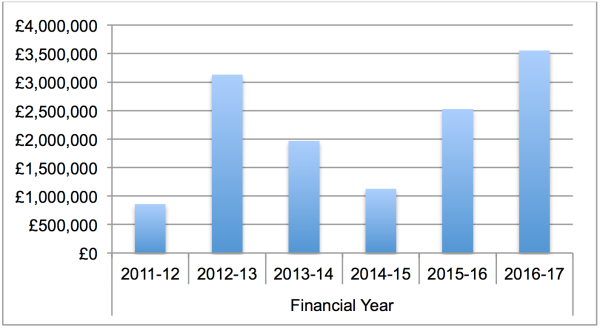07 August 2017
The ICO will be given more power and issue higher fines. Graph shows fines issued so far by the commissioner under the Data Protection Act and Privacy of Electronic Communication Regulations.
The government has committed to updating and strengthening data protection laws through a new Data Protection Bill.
Research shows that more than 80 per cent of people feel that they do not have complete control over their data online, says the government. It claims the revised legislation will provide everyone with the confidence that their data will be managed securely and safely.
Under the plans outlined in a statement of intent published today, individuals will have more control over their data by having the right to be forgotten and ask for their personal data to be erased. This will also mean that people can ask social media channels to delete information they posted in their childhood.
The statement says reliance on default opt-out or pre-selected ‘tick boxes’, which are largely ignored, to give consent for organisations to collect personal data will also become a thing of the past.
Businesses will be supported to ensure they are able to manage and secure data properly. The data protection regulator, the Information Commissioner’s Office (ICO), will also be given more power to defend consumer interests and issue higher fines, of up to £17 million or four per cent of global turnover, in cases of the most serious data breaches.
“Our measures are designed to support businesses in their use of data, and give consumers the confidence that their data is protected and those who misuse it will be held to account,” says digital minister Matt Hancock.
“The new Data Protection Bill will give us one of the most robust, yet dynamic, set of data laws in the world. The Bill will give people more control over their data, require more consent for its use, and prepare Britain for Brexit. We have some of the best data science in the world and this new law will help it to thrive.”
The Data Protection Bill will make it simpler to withdraw consent for the use of personal data, allow people to ask for their personal data held by companies to be erased; and enable parents and guardians to give consent for their child’s data to be used.
It will require ‘explicit’ consent to be necessary for processing sensitive personal data, expand the definition of ‘personal data’ to include IP addresses, internet cookies and DNA, and update and strengthen data protection law to reflect the changing nature and scope of the digital economy.
The bill will also:
- Make it easier and free for individuals to require an organisation to disclose the personal data it holds on them
- Make it easier for customers to move data between service providers
- Create new criminal offences to deter organisations from either intentionally or recklessly creating situations where someone could be identified from anonymised data
Furthermore, data protection rules will be made clearer for those who handle data but they will be made more accountable for the data they process with the priority on personal privacy rights.
Those organisations carrying out high-risk data processing will be obliged to carry out impact assessments to understand the risks involved.
The government says the bill will bring the EU’s General Data Protection Regulation (GDPR) into UK law, helping Britain prepare for a successful Brexit.
techUK CEO Julian David says: “This statement of intent is an important and welcome first step in that process. techUK supports the aim of a Data Protection Bill that implements GDPR in full, puts the UK in a strong position to secure unhindered data flows once it has left the EU, and gives businesses the clarity they need about their new obligations.”
techUK says it represents more than 950 companies that collectively employ around 700,000 people which is about half of all the UK's technology sector jobs.










